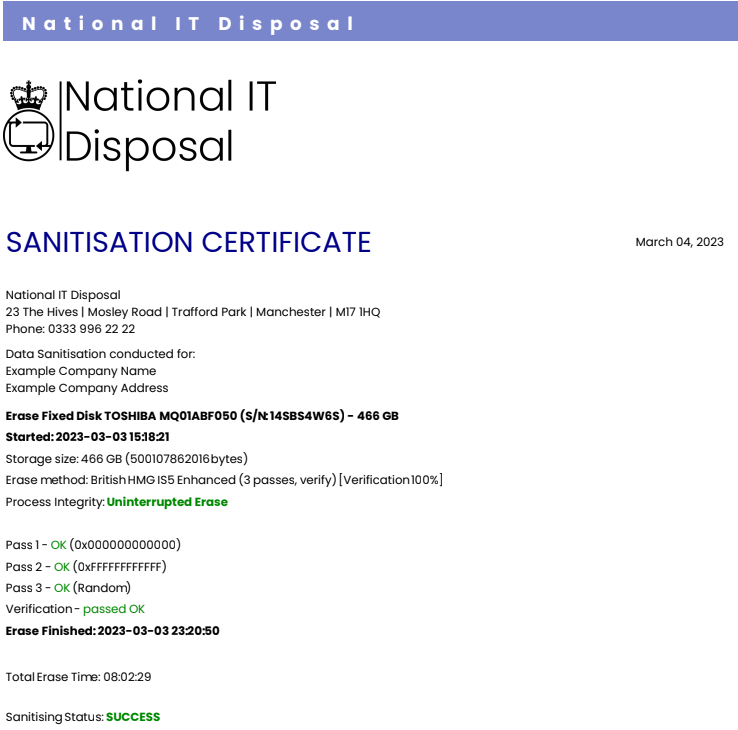Data sanitisation is a critical process which ensures that sensitive information is permanently removed from storage media, rendering it unrecoverable. The process of sanitising data is particularly important for all businesses and organisations. In the United Kingdom, the government has set a standard for data sanitisation known as HMG Infosec Level 5 Enhanced. In this National IT Disposal article, we will explore what HMG Infosec Level 5 Enhanced entails and why it is crucial for organisations to adhere to this standard.
HMG Infosec Level 5 Enhanced is a set of guidelines developed by the UK government for the secure sanitisation of data. These guidelines are based on the standards set by the National Cyber Security Centre (NCSC) and provide a comprehensive framework for the secure disposal of sensitive information. HMG Infosec Level 5 Enhanced is designed to meet the most stringent security requirements.

The process of data sanitisation involves the secure, confidential, and complete elimination of all data from storage media, such as hard drives, solid-state drives, USB drives and all other types of storage media. The process is irreversible, and the stored data is rendered completely unreadable and unrecoverable. The mechanism of HMG Infosec Level 5 Enhanced sanitisation consists of three passes whereby every data bearing unit on the storage media is initially overwritten with 1s, followed by 0s, and finally with randomly generated 1s and 0s. The process is then verified to ensure that data sanitisation has been entirely successful. At National IT Disposal we use specialised software and hardware to complete Data Sanitisation to the HMG Infosec Level 5 Enhanced protocol.
One of the key requirements of HMG Infosec Level 5 Enhanced is that the sanitisation process must be auditable. This is why National IT Disposal provides all of its clients with data sanitisation certificates which include the date and time of each sanitisation event, the type of storage media that was sanitised, and the specific sanitisation method that was used. The Data sanitisation certificates that we issue must be retained by our clients for a minimum of five years and must be made available for review by authorised personnel.

Another critical aspect of HMG Infosec Level 5 Enhanced is the need for physical security measures to protect the storage media during the sanitisation process. This includes the use of secure storage and the presence of authorised personnel during the sanitisation process. At National IT Disposal, all data-bearing media is confined to a specific secure location in our facility, with a DBS-enhanced vetted member of staff who has been trained and certified in Data Sanitisation always present in this secure access-controlled location. The guidelines also recommend the use of specialised sanitisation facilities, such as National IT Disposal, that are equipped with the necessary hardware and software to ensure that the sanitisation process is performed correctly.
The consequences of failing to adhere to HMG Infosec Level 5 Enhanced can be severe. Organisations that handle sensitive information risk significant financial and reputational damage if data is compromised due to inadequate data sanitisation. In addition, non-compliance with HMG Infosec Level 5 Enhanced can result in legal and regulatory action, including fines and sanctions.
In conclusion, data sanitisation is a critical process that organisations must undertake to protect sensitive information. HMG Infosec Level 5 Enhanced provides a comprehensive framework for the secure disposal of data and is mandatory for organisations that handle information. Compliance with HMG Infosec Level 5 Enhanced is essential to ensure that sensitive information is permanently destroyed from storage media and is not susceptible to recovery.
Using National IT Disposal ensures that your organisation completely complies with the stringent guidelines outlined in this article. Our fail-safe processes also help your organisation to mitigate the risk of data breaches and protect itself from the potentially severe consequences of non-compliance.


